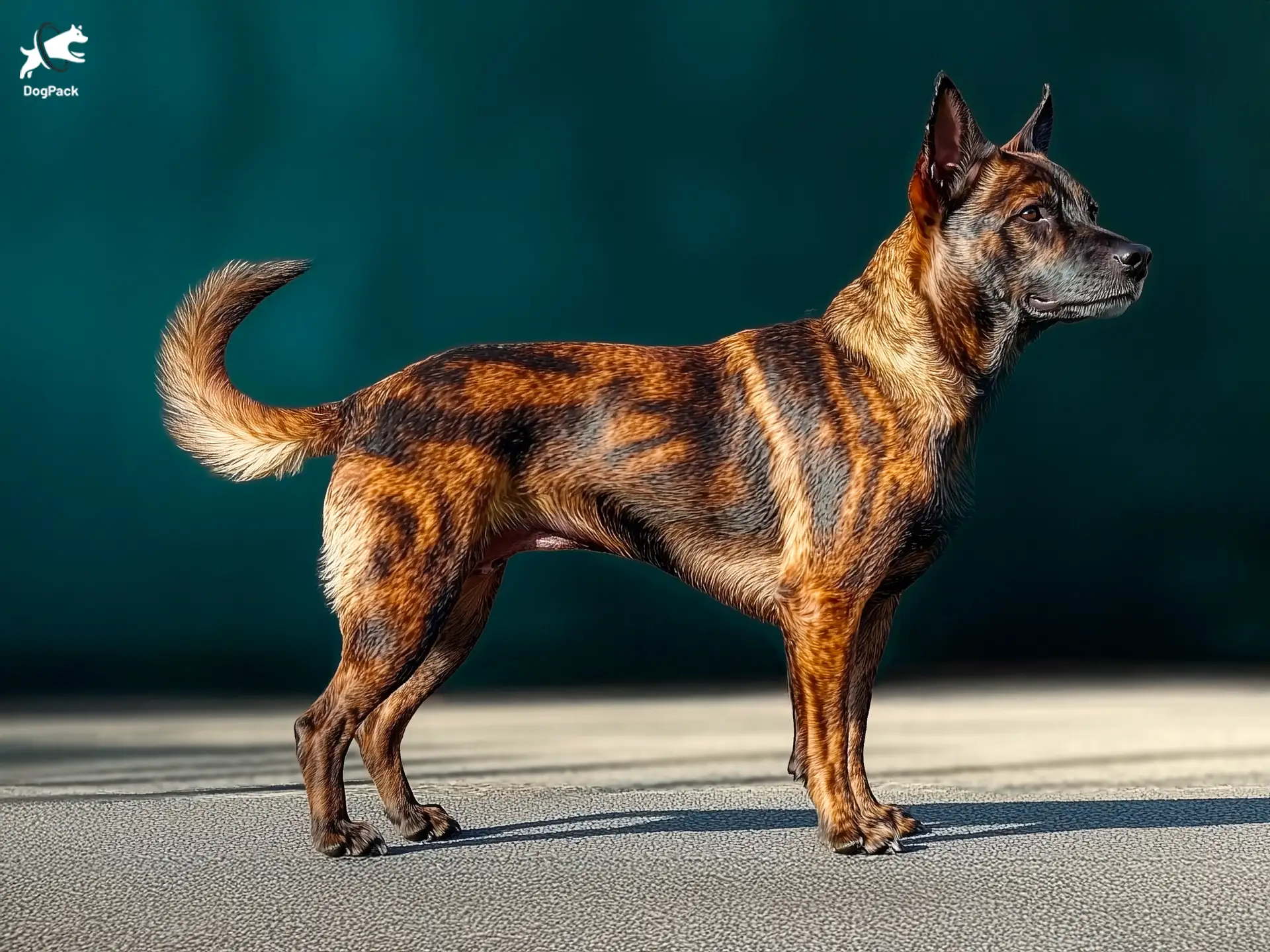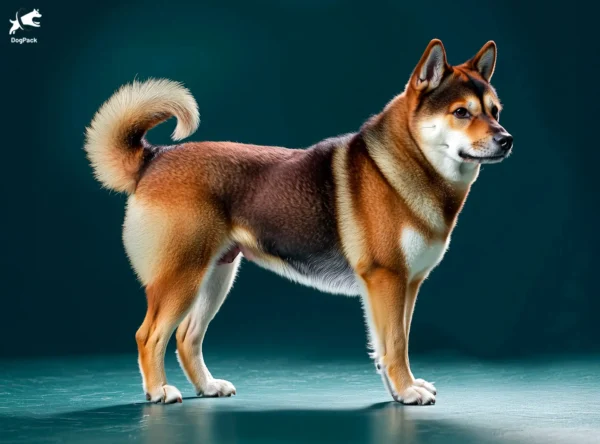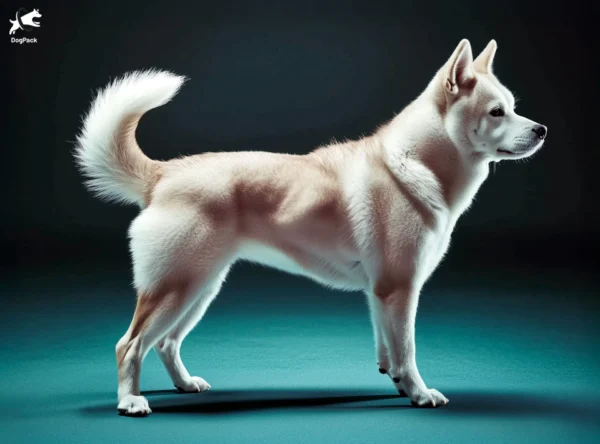Kai Ken Dog Breed Info & Overview
The Kai Ken, a rare and ancient breed from Japan, is known for its striking brindle coat and exceptional hunting abilities. Medium-sized and highly intelligent, these dogs are both loyal and agile, thriving in active households that embrace their adventurous spirit. With proper training and socialization, the Kai Ken becomes a devoted and versatile companion, blending its natural instincts with a strong bond to its family.
Characteristics
Pictures
Breed History
In the remote mountainous regions of Japan’s Yamanashi Prefecture, these dogs evolved as exceptional hunters adept at traversing rugged terrain. Their brindle coats allowed them to blend into dense forests, making it easier to surprise prey. Over centuries, their skills sharpened naturally, ensuring resilience and keen instincts became part of their genetic makeup.
Initially prized by local hunters for pursuing boar and deer, they were carefully bred to maintain purity and working ability. Many early accounts highlight their unwavering loyalty to handlers, making them valued partners rather than mere tools. As communities became more settled, these dogs developed a stable temperament that aligned well with human companionship.
Over time, selective breeding shaped a more uniform appearance and bolstered their reputation within Japan. Eventually, national recognition led to the Kai Ken being designated a Natural Monument, reflecting cultural pride in their heritage. Although not widely exported, interest abroad has grown, ensuring that future generations appreciate this remarkable breed’s ancient lineage and natural prowess.
Temperament, Personality
They’re known for a quiet confidence that reveals itself as steady alertness rather than brash displays. With family members, they tend to be gentle and devoted, forging strong bonds over time. Visitors may find them reserved at first, but patience and respectful introductions often earn their trust, making them attentive and agreeable companions.
While they generally coexist peacefully with other pets they’ve grown up alongside, unfamiliar animals can trigger protective instincts. Supervision is wise, especially if small, furry creatures share their environment. Children who understand gentle handling and respectful boundaries often receive a calm, watchful friend, though rambunctious, unsupervised play might cause stress or anxiety.
The Kai Ken’s temperament can be described as intelligent, loyal, and strongly independent. Unlike breeds that eagerly embrace newcomers, they may need extra time to warm up, reflecting deep-rooted vigilance. With proper socialization, their shyness fades, revealing an affectionate nature eager to connect with humans who respect their space and personality.
Physical Characteristics
Gracefully built, these dogs have a lean, athletic structure that supports swift movement over rugged landscapes. Medium in size, they typically stand with a poised posture that conveys both readiness and confidence. Their frame is strong yet not bulky, striking a balance that offers agility in pursuit of game or navigating challenging terrains.
Their hallmark coat comes in unique brindle patterns, often described as “tiger-striped.” This coloration ranges from subtle, faint lines to bold, contrasting streaks that stand out in natural light. A double-coat keeps them warm during colder months, while shedding can be moderate but manageable with regular grooming sessions that keep their coat healthy and vibrant.
The Kai Ken’s distinctive wedge-shaped head and erect, triangular ears reflect its keen senses and alert nature. Dark, expressive eyes hint at the breed’s thoughtful intelligence, while a well-defined muzzle and sturdy jaws underscore its hunting heritage. Overall, their elegant silhouette complements their rugged abilities, making them unmistakably unique.
Health Issues
These dogs generally enjoy robust health, thanks to their natural development in challenging environments. However, they aren’t entirely immune to inherited conditions. Common issues may include hip dysplasia, which affects joint stability, and occasional knee problems. Early detection through regular veterinarian check-ups can make a significant difference in managing such concerns.
Eye conditions, though not extremely common, can appear in some individuals. Routine examinations ensure any emerging issues receive prompt attention. Good grooming habits also help detect skin irritations or parasites early, reducing discomfort. A balanced diet and consistent exercise maintain overall fitness, strengthening immune systems and helping prevent many potential ailments.
The Kai Ken benefits from attentive owners who stay proactive about health. Regular ear checks remove debris that might lead to infections, while dental hygiene prevents gum disease. Vaccinations follow standard veterinary protocols, and a comprehensive wellness plan can significantly reduce health risks, ensuring a long, active life free of unnecessary discomfort.
Grooming Needs
Maintaining a healthy coat involves regular brushing, typically once or twice a week. This keeps their distinctive brindle pattern vibrant and helps remove loose hairs before they accumulate. During seasonal shedding periods, more frequent grooming may be necessary to manage the influx of fur and keep your living space relatively fuzz-free.
Baths aren’t required often, maybe every two or three months, unless they roll in something unpleasant. Using a gentle, canine-safe shampoo preserves their skin’s natural oils. Proper drying prevents damp fur from causing discomfort or odor. Incorporating these steps into a routine ensures their coat stays clean, comfortable, and pleasantly scented.
The Kai Ken also benefits from routine ear checks, gently wiping away wax and moisture to prevent infections. Regular nail trims keep paws comfortable, especially if their natural environment doesn’t wear down nails. Including tooth-brushing sessions supports oral health, ensuring they remain both handsome and well-equipped for their active lifestyle.
Exercise Requirements
Plenty of daily activity keeps these athletic dogs content and well-behaved. Long walks, brisk jogs, or challenging hikes are all excellent options. Their natural stamina and agility suit them perfectly for outdoor adventures. Ensuring regular outings helps channel their energy into positive pursuits, leaving them more relaxed and attentive back at home.
Structured play sessions, like fetch or tug-of-war, engage their minds as well as muscles. Visiting secure, fenced areas where they can safely roam off-leash provides valuable enrichment. Without ample exercise, boredom might emerge, leading to destructive habits. Integrating variety and consistency ensures they remain physically fit and mentally content throughout adulthood.
The Kai Ken thrives when engaged in activities that challenge both mind and body. Incorporating scent work, agility courses, or puzzle toys taps into their instincts while preventing monotony. By balancing vigorous exercise, interactive play, and regular exploration, you’ll nurture a strong bond and keep them happy, fulfilled, and ready for action.
Training Tips
Training these dogs requires patience, consistency, and plenty of encouragement. They respond best to calm guidance rather than harsh corrections. Using treats, praise, and a favorite toy can reinforce desired behaviors more effectively than raised voices. Short, focused sessions work well, ensuring they remain attentive without becoming frustrated or bored.
Introducing commands gradually allows them to absorb new information at their own pace. Avoid overwhelming them with too many lessons at once. Early socialization with other dogs and humans fosters confidence, helping them navigate unfamiliar situations more gracefully. Encouraging problem-solving, like simple obstacle courses, taps into their natural intelligence.
While the Kai Ken often thrives under positive methods, they can display a stubborn streak if pushed too hard. Finding the sweet spot between firmness and flexibility encourages cooperation. Over time, a consistent training routine establishes mutual respect and understanding, ensuring a rewarding experience for both handler and faithful companion.
Nutrition, Diet
Their heritage as nimble mountain hunters influences their nutritional needs. High-quality protein sources, like lean game meats or sustainably sourced fish, mirror their ancestral diet. These nutrient-rich options help maintain muscle tone and overall vitality. Pairing protein with moderate fats and a well-balanced mix of complex carbohydrates ensures they receive the energy required for active pursuits.
Portion sizes matter. An adult around 60 pounds might thrive on approximately 2.5 to 3 cups of premium kibble daily, divided into two meals. Adding occasional oily fish, such as mackerel or sardines, supports a gleaming coat and healthy skin. Always measure servings, adjusting portions based on activity level and season.
The Kai Ken benefits from diets free of cheap fillers, artificial additives, and overly processed ingredients. Fresh vegetables or fruits occasionally add beneficial fiber and antioxidants. Monitoring their weight and consulting a veterinarian for tailored advice ensures they remain strong and energized, ready to tackle whatever challenges their dynamic lifestyle presents.
Adoption, Breeders
Because of their rarity, finding these dogs may involve working closely with dedicated breed clubs or specialized rescue organizations. Some groups focus on preserving their lineage and promoting responsible ownership, which can guide you toward ethical sources. Patience is key, as you might join a waiting list before bringing home your future companion.
Reputable breeders often belong to national associations or maintain detailed records of lineage, health testing, and temperament evaluations. Consider contacting the Kai Ken Society of America or browsing listings at Good Dog for leads. Reaching out to established breeders ensures a well-socialized puppy raised under ideal conditions.
When adopting a Kai Ken, ensure the chosen source prioritizes health screenings, ethical practices, and post-adoption support. This might include helpful tips on acclimating your newcomer, recommended veterinarians, or ongoing guidance. By doing your homework, you’ll establish a foundation for a harmonious, long-lasting relationship with your distinctive canine partner.
Family Pet?
Active families who appreciate outdoor activities may find this breed an excellent addition. Hiking, nature walks, and backyard play sessions allow these dogs to shine. If family members understand their independent nature and give them space to adjust at their own pace, a respectful, loving relationship can blossom over time.
They often do well with children who respect boundaries and treat animals kindly. Rough play or startled reactions may unsettle them, so gentle guidance is crucial. Encouraging kids to participate in training sessions or daily walks fosters mutual understanding, strengthening the bond and ensuring everyone feels comfortable together.
The Kai Ken integrates seamlessly into families willing to invest time in their care. With clear communication, consistent routines, and respectful handling, they quickly learn household expectations. Their even temper and devotion can bring warmth and stability, making them a cherished family member for those prepared to meet their needs.
Right For You?
This breed is a match for those who value authenticity and charm over constant, eager-to-please behavior. If you enjoy hiking, exploring nature, or challenging yourselves together, you’ll appreciate their partnership. They’re not the best fit if you prefer a laid-back lap dog content with minimal exercise, so consider your own habits first.
A household that understands boundaries and offers ample mental stimulation will help them thrive. By providing consistent training, plenty of outdoor experiences, and a quiet space for rest, you’ll see their personality shine. A noisy, chaotic environment might be overwhelming, so think carefully about whether your home suits their calm demeanor.
For those who appreciate subtlety and tradition, the Kai Ken brings a sense of history into modern life. Choosing them means embracing a balanced companionship that rewards patience, effort, and understanding. Reflect on your lifestyle, ambitions, and willingness to meet their needs before committing to this extraordinary, richly cultured canine friend.
Conclusion
The Kai Ken stands out as a rare, historically significant breed that demands respect, understanding, and engagement. For owners willing to invest time in consistent training, outdoor exploration, and affectionate guidance, these dogs can become extraordinary companions. Their natural hunting instincts, combined with loyal devotion, create an experience unlike many more common breeds.
While they require patience and attentiveness, the rewards are immense—enjoying a bond rooted in tradition, intellect, and courage. If this unique character resonates with you, consider welcoming one into your life. Feel free to share your experiences and insights, building a community of Kai Ken enthusiasts who appreciate their singular charms.
FAQs
-
Are Kai Ken known for any special vocalizations?
While not overly vocal, Kai Ken sometimes produce distinctive, low-throated murmurs alongside their standard barks. This subtle communication reflects their attentive nature and can indicate curiosity or mild alertness. Observing their vocal patterns helps you understand their mood and respond accordingly.
-
How does the Kai Ken’s brindle coat develop over time?
Kai Ken puppies are typically born with solid-colored coats that gradually develop brindle striping as they mature. This “tiger stripe” pattern becomes more pronounced with age, giving the breed its distinctive appearance.
-
Are Kai Ken dogs known for their climbing abilities?
Yes, the Kai Ken is renowned for its exceptional climbing skills. Originating from Japan’s mountainous regions, they have adapted to navigate steep terrains, making them adept climbers compared to other breeds.
-
How does the Kai Ken’s temperament differ from other Japanese breeds?
The Kai Ken is known for its strong loyalty and independence. While they share traits with other Japanese breeds, their unique combination of wariness towards strangers and deep family bonds sets them apart.
-
What is the significance of the Kai Ken’s “Tora Inu” nickname?
“Tora Inu,” meaning “Tiger Dog,” refers to the Kai Ken’s distinctive brindle coat, which resembles tiger stripes. This nickname highlights the breed’s unique appearance and is a testament to its cultural heritage in Japan.
Breed Ratings
The Kai Ken is quick-witted and adapts well to varied tasks, learning commands fast with patient, positive training.
Enjoys active games but maintains a calm demeanor, preferring purposeful activities over endless roughhousing.
The Kai Ken is energetic and thrives on regular exercise, though they settle nicely once their daily needs are met.
Moderate shedding, especially during seasonal transitions. Regular brushing keeps their coat tidy and reduces fur indoors.
Strong hunting instincts may surface around small animals, so supervision and training help manage their keen predatory nature.
Routine brushing and occasional baths are needed, but their coat is fairly low-maintenance compared to fluffier breeds.
Intelligent but independent, they respond best to gentle, consistent guidance rather than harsh methods or rushed lessons.
Prefers human interaction and can become bored or anxious if left for long periods without mental stimulation.
Generally quiet, they bark or vocalize when necessary, communicating alertness rather than seeking constant attention.
Minimal drooling, they usually keep their muzzle tidy, making them relatively neat companions around the house.
Can get along with other dogs if socialized early, though they may remain somewhat reserved around unfamiliar canines.
Generally robust with few serious issues, they benefit from regular vet checks and a balanced diet to stay fit.













